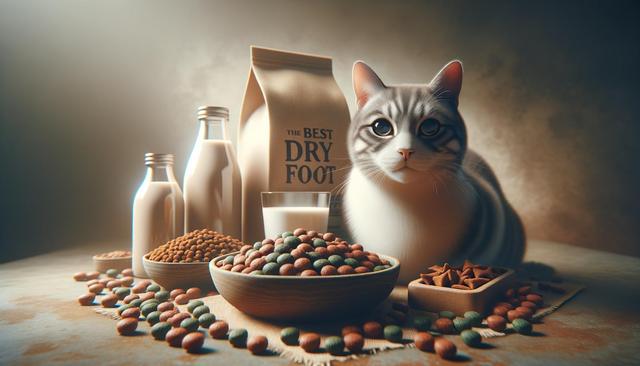Understanding Your Cat’s Nutritional Needs
Every cat has unique dietary requirements based on age, lifestyle, and health conditions. Selecting the right dry food starts with understanding these needs. For instance, kittens need food that supports rapid growth and development, while adult cats require a balanced diet to maintain a healthy weight and coat. Older cats may benefit from formulas that support joint health and are easier to digest.
Dry cat food offers the convenience of easy storage and portion control, making it a popular choice for many pet owners. It also helps reduce plaque buildup due to its crunchy texture. When looking for the best dry food for kittens, it’s important to find options that are rich in essential nutrients like DHA, proteins, and vitamins. Adult cats that live indoors may need specially formulated dry cat food for indoor cats to help manage weight and reduce hairballs.
Key components to examine on the label include:
- Animal-based proteins as the first ingredient
- Low filler content like corn or soy
- Added vitamins, minerals, and taurine
Understanding these basics ensures that you can make informed decisions when choosing a food that meets your pet’s specific needs.
Why Protein Matters in a Cat’s Diet
Cats are obligate carnivores, meaning they require a diet rich in animal protein. Choosing a high protein dry cat food can help maintain muscle mass, support a healthy immune system, and contribute to overall vitality. Protein is especially important for active cats, kittens, and those recovering from illness or surgery.
Look for dry foods that list real meat like chicken, turkey, or fish as the first ingredient. Avoid products with vague terms like “meat by-products” or “animal digest.” Options labeled as high protein dry cat food often cater to cats with higher energy needs or those on low-carb diets. These formulas are typically lower in grains and higher in meat content, aligning with a cat’s natural dietary preferences.
Benefits of high-protein dry cat food include:
- Improved muscle tone and strength
- Better coat quality and skin health
- Support for metabolic function
While high-protein diets can be beneficial, it’s still essential to consider your cat’s age, weight, and activity level when selecting a product.
Options for Cats with Sensitive Stomachs
Some cats experience digestive issues, ranging from vomiting to diarrhea or food aversions. Choosing the best dry cat food for sensitive stomachs can help alleviate these symptoms and promote better digestion. These foods are typically made with limited ingredients and exclude common allergens like dairy, corn, and artificial additives.
Formulas designed for sensitive stomachs often include ingredients like:
- Easily digestible proteins (e.g., turkey, lamb)
- Prebiotic fibers and probiotics
- Omega-3 fatty acids to reduce inflammation
Transitioning to a new food should be done gradually to avoid upsetting your cat’s digestive system. Start by mixing a small amount of the new food with the old, increasing the ratio over 7–10 days. Monitoring your cat during this time will help identify any improvements or adverse reactions.
Providing the best dry cat food for sensitive stomachs not only improves digestion but also enhances nutrient absorption, leading to a happier and healthier feline.
Finding Reliable Dry Cat Food Brands
When it comes to choosing the right brand, it’s helpful to look at top rated dry cat food brands that have earned a reputation for quality and consistency. These brands often undergo rigorous testing, meet AAFCO standards, and incorporate feedback from veterinarians and pet nutritionists.
What sets reliable brands apart includes:
- Transparent ingredient sourcing
- Clear labeling of nutritional content
- Commitment to ongoing research and development
Some of the top rated dry cat food brands offer a variety of formulas tailored to life stages, health needs, and flavor preferences. Whether you’re looking for grain-free, organic, or specialized diets, reputable brands provide numerous options to suit your cat’s profile.
It’s also helpful to read customer reviews and consult with your veterinarian when selecting a brand. A consistent feeding routine using trusted products can contribute greatly to your cat’s long-term health.
Indoor Cats and Their Unique Requirements
Indoor cats often lead more sedentary lives compared to their outdoor counterparts, which can lead to weight gain and digestive issues. Choosing dry cat food for indoor cats specifically formulated for their needs can help manage these challenges.
These specialized formulas typically include:
- Lower calorie content to prevent weight gain
- Added fiber to support digestion and reduce hairballs
- Essential nutrients like taurine and antioxidants for overall health
Feeding indoor cats the right food not only supports physical health but also contributes to mental well-being. Some brands include natural flavors and textures that mimic prey, helping to stimulate your cat’s interest in eating.
In addition to choosing the right food, ensure your indoor cat gets regular exercise and mental stimulation through toys, climbing structures, and interactive play. This holistic approach ensures your pet maintains a healthy weight and remains active and engaged.

Leave a Reply